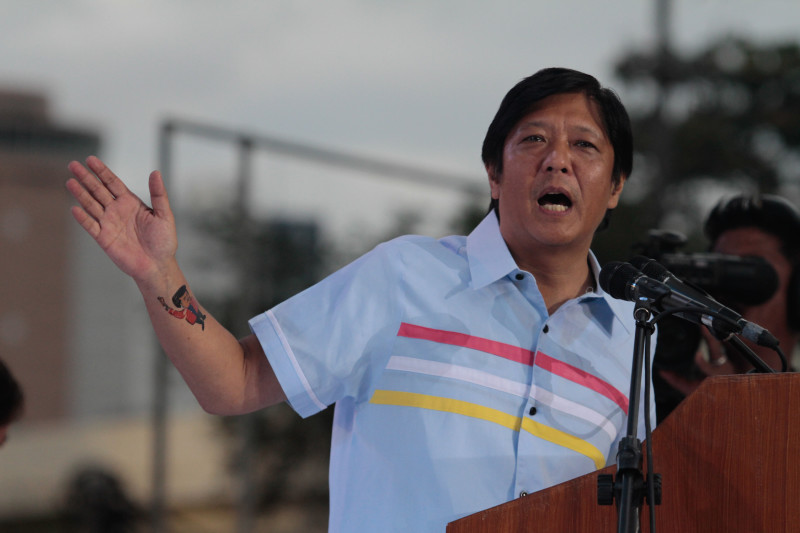
Vice presidential candidate Sen. Ferdinand “Bongbong” Marcos. INQUIRER FILE PHOTO / LEO M. SABANGAN II
Many are expressing wonder at how the prospect of Ferdinand “Bongbong” Marcos Jr. winning the vice presidency has become so real, despite what seems to be seen by most in my generation as the negative legacy of the Marcos dictatorship. The latest polls show him either tied for the lead, if not solely in the lead, for the second top position of the land. I’ve heard friends remark that the more his detractors, including President Aquino himself, talk of the elder Marcos’ human rights abuses and economic plunder, the stronger the son’s numbers get. Many lament the loss of the “spirit of Edsa” just 30 years after that crucial turning point in the nation’s history.
I was with my esteemed ex-boss, former president Fidel V. Ramos, last week at the annual meeting of his Ramos Peace and Development Foundation. We discussed the EDSA@30 lecture series, where FVR and others closely associated with the People Power Revolution have spoken about the martial law years to young people in 18 university campuses nationwide so far. He told us that a sentiment that is consistently raised by their young audiences is a perception of the Marcos era as golden years when the country enjoyed strong discipline and a strong economy. It appears that this is the image firmly implanted in the minds of today’s young Filipinos, who now make up the bulk of our voting population.
Indeed, we must realize that every Filipino 30 years old and below was born after the overthrow of the Marcos dictatorship, and their only image of those dark years of our history came primarily from what they’ve read in their high school history books. Some would have heard accounts from their parents, especially those who were direct victims of the repressive regime. But given the unfortunate but all too common reality of parents being too busy to participate more actively in their children’s education, it’s more likely that the history books have been the more telling influence. And it seems that while no one was looking, a whole generation of Filipinos’ view of martial law was distorted by history textbooks written by authors who, for one reason or another, may have been too kind to the former leader. That the phrases “strong discipline” and “strong economy” reportedly kept coming up from Ramos’ EDSA@30 audiences could be a mere reflection of how their history textbooks described the Marcos era.
This reminds me of a letter I received 11 years ago from a concerned reader who wrote to express his disgust upon seeing his son’s fourth year high school economics textbook, “Economics: Theories and Principles,” published by Vibal Publishing House and authored by Teofista Vivar, Evelina Viloria, Julia Rillo, Exuferencia Mina, Purificacion Jacob and Julius Espero. He wrote me then: “I was flabbergasted to note that in Chapter 2 (page 22-23) of said book, under ‘Economic Highlights of the Administrations’: (1) Under the [Corazon] Aquino administration, the only accomplishment identified was ‘The US bases were dismantled,’ (2) the Ramos administration was totally omitted (i.e., as if it never existed at all), and (3) under Estrada’s regime 10 economic accomplishments were listed, the most cited under ALL the administrations since President Roxas (1946-48).” I bought a copy of the textbook then and confirmed his complaint.
It doesn’t take a historian or economist to detect an obvious political bias on the part of those authors. For them to more than subtly manifest such bias and mislead young minds in the process is reprehensible, to say the least. Young students ought to have a fair account of the accomplishments of all administrations, regardless of the authors’ personal biases. It would seem that the Department of Education had been remiss in exercising proper quality control over the textbooks our children are reading. Such blatant bias, let alone factual errors, has no place in our children’s school textbooks.
If that was in fact the kind of quality control we had on our school textbooks 10 years ago, then I’m not surprised that today’s young Filipinos had it ingrained in their minds that the years of the Marcos dictatorship were “golden years.” Some now even apparently believe that Marcos was our best president ever. That image, imprinted firmly in the minds of millions of young Filipinos because that’s what they gathered from their high school history books, will be impossible to change in the course of a national election campaign.
Four years ago, the DepEd, apparently realizing the problem, announced a “new approach” to teaching students about martial law. Observing that students base their knowledge on what is in the textbooks, Education Secretary Armin Luistro espoused a new approach whereby students will be taught the facts about when, how and why Ferdinand Marcos proclaimed martial law. “But they will also be taught to look at other primary sources where they can dig up more information about what happened during that period, and which can include the disappearances or killings,” Luistro said. “They will be taught to reflect about how all those events have shaped their lives and communities… [and] in so doing, they can come to their own judgment of how martial law went. So if we want to ask, ‘Was Marcos a great President?’ we will let the child arrive at that conclusion.”
Perhaps that change, if indeed effectively executed in our schools, could lead, maybe 10 or so years later, to a perspective different from what our young voters now predominantly have. Meanwhile, some of my friends are betting, without necessarily welcoming it, that Bongbong Marcos will be our next vice president.
* * *
cielito.habito@gmail.com

